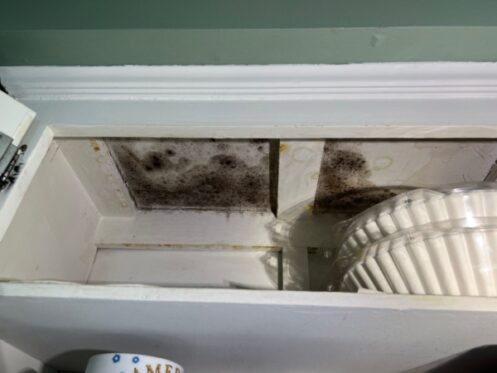When we think of mold’s health effects, we often associate it with respiratory issues or allergic reactions when inhaled. However, mold lurking in our homes can have profound effects on our gastrointestinal health. These symptoms can include nausea, vomiting, diarrhea, or abdominal discomfort.
A recent Yahoo Life article got us thinking about the surprising connection between household mold and gut health. Respiratory health gets plenty of attention, so we want to delve into the lesser-known health effects of household mold.
Mycotoxins Weaken Your Gut’s Defenses
Your gut is home to trillions of bacteria, collectively known as the gut microbiota, which play a crucial role in digestion, immune function, and overall health. When exposed to household mold through airborne spores, the microbiota’s balance is disrupted.
Mold spores produce mycotoxins, which are toxic compounds harmful to humans. A 2021 study published by the National Library of Medicine found that mycotoxins can influence the gastrointestinal system through antimicrobial activity.
When inhaled or ingested, these mycotoxins can disrupt the microbiome—the community of beneficial bacteria in the digestive system. This disruption can weaken the gut’s natural defense mechanisms against harmful pathogens, making it more susceptible to infections and inflammation.
Gastrointestinal Effects
Mold exposure has been linked to various gastrointestinal symptoms, including nausea, vomiting, diarrhea, abdominal pain, and bloating. These symptoms can range from mild discomfort to more severe digestive disturbances, depending on the individual’s sensitivity and the extent of mold exposure.
Chronic exposure to mycotoxins can compromise the intestinal barrier function, contributing to digestive disorders:
- Irritable bowel syndrome (IBS): Mold exposure can exacerbate symptoms of IBS, such as abdominal pain, bloating, diarrhea, and constipation.
- Gastrointestinal inflammation: Mycotoxins can trigger inflammation in the gastrointestinal tract, leading to conditions like gastritis, colitis, or enteritis.
- Leaky gut syndrome: Mycotoxins can disrupt the integrity of the intestinal barrier, leading to increased intestinal permeability or “leaky gut.” This allows toxins, pathogens, and undigested food particles to enter the bloodstream, triggering immune responses and inflammation.
- Gastrointestinal infections: Mold exposure can weaken the gut’s natural defense mechanisms, making it more susceptible to infections by harmful pathogens such as bacteria, viruses, or parasites.
- Food intolerances and sensitivities: Mold exposure may contribute to the development of food intolerances or sensitivities, leading to symptoms like nausea, vomiting, abdominal cramps, and diarrhea after consuming certain foods.
Preventing These Gut Health Concerns
To protect your gut health from the effects of household mold, it’s essential to address mold growth and exposure in your home. This includes identifying and remedying areas of moisture and humidity where mold thrives, such as bathrooms, basements, and kitchens. Proper ventilation, moisture control, and regular inspection for mold are key preventive measures.
Maintaining a healthy diet rich in fiber, probiotics, and prebiotics can support gut health and resilience against mold-related digestive issues. Consuming fermented foods, such as kimchi, kefir, and sauerkraut, can help promote a diverse and balanced gut microbiota, enhancing immune function and digestive wellness.
Not everyone exposed to airborne mold will experience stomach-related symptoms. Still, by understanding the link between mold exposure and digestive health, we can take proactive steps to protect ourselves and our families. If you suspect mold exposure is affecting your gut health, it’s essential to consult a healthcare professional for proper evaluation and treatment.



